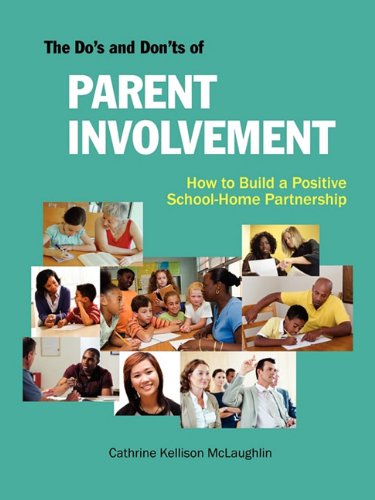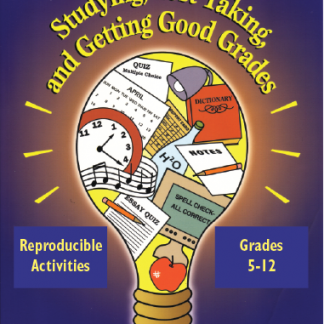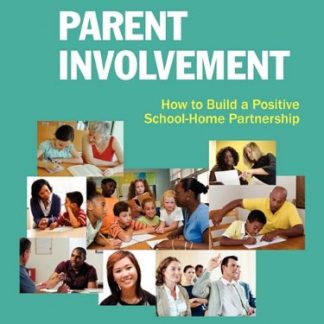The Do’s and Don’ts of Parent Involvement
$25.95
Cathrine Kellison McLaughlin
Parents possess the potential to be powerful conduits to the academic, social, and emotional growth of their children, yet are often abandoned by systems too overburdened, uninformed, or apathetic to use them well. And so they remain an untapped resource.
The Do’s and Don’ts of Parent Involvement fills the voids that keep parents from becoming motivated and involved. It tells you how to have parents turn out in numbers, and precisely how to train them and effectively utilize their skills. Includes step-by-step guidelines for forming and managing parent groups, along with activities and sample tools — letters, memos, surveys, and more. Talks directly to those involved with children, from preschool through high school:
- Administrators
- Teachers
- Counselors
- Parents and Families
- Community Groups
Table of Contents
Introduction
Section One: Who Are Today’s Parents
Who Are Today’s Parents?
What Makes an “Involved Parent?”
Parent Involvement: How It Benefits Teachers
Administrators Play a Crucial Role
Reaching Out to Culturally Diverse Parents
The Components of an Effective Parent-involvement Program
Steps in Starting a Parent-involvement Program
What Are the Obstacles to Parent Involvement?
The Great Rewards of Parent Involvement
Section Two: Reaching Out!
1. Ways to Reach Out to Parents
2. Keeping Parents Involved
3. Gathering Information
4. Conferences, Interviews and Home Visits
5. Asking Parents to Volunteer at School
6. Social Gatherings, Projects, and Events
7. Organizing Parent Groups
8. Forty-five Ways to Give Recognition to Volunteers
Section Three: Parents Reach Out — to the School and Each Other
The Children Are the Focus
Parents Reaching Out to Teachers
Parents Reaching Out to Each Other
Parent Organizations
Sample Surveys, Letters, Bulletins, and Other Tools
Who Is a Counselor?
Hello Parents. We’d like to get to know you better!!
Student and Parent: What Concerns You?
Newsletter Survey
Teachers’ Questions for Parents
A Student-Teacher-Parent Agreement
Teacher’s Commitment to the Family
Teacher-to-Family Bulletin
Parent-to-Teacher Bulletin
Parent-Teacher Conference Guidelines
Welcome to the PS1 Parent-Teacher Conference
I’m Excited About Meeting You!
Questions the Parent Can Ask the Teacher in the Conference
A Phone Call to the Child’s Home: Suggested Script
A Volunteer Checklist
Community Volunteer Survey
Help! Your School Needs You! Help!
Teacher’s Request for Classroom Volunteer
Your PTA (membership recruitment letter)
Primary Subject Area – Counseling
Grades Pre-K-12, 184 pages, 8-1/2 x 11, paperback
Description
Cathrine Kellison McLaughlin
Parents possess the potential to be powerful conduits to the academic, social, and emotional growth of their children, yet are often abandoned by systems too overburdened, uninformed, or apathetic to use them well. And so they remain an untapped resource.
The Do’s and Don’ts of Parent Involvement fills the voids that keep parents from becoming motivated and involved. It tells you how to have parents turn out in numbers, and precisely how to train them and effectively utilize their skills. Includes step-by-step guidelines for forming and managing parent groups, along with activities and sample tools — letters, memos, surveys, and more. Talks directly to those involved with children, from preschool through high school:
- Administrators
- Teachers
- Counselors
- Parents and Families
- Community Groups
Table of Contents
Introduction
Section One: Who Are Today’s Parents
Who Are Today’s Parents?
What Makes an “Involved Parent?”
Parent Involvement: How It Benefits Teachers
Administrators Play a Crucial Role
Reaching Out to Culturally Diverse Parents
The Components of an Effective Parent-involvement Program
Steps in Starting a Parent-involvement Program
What Are the Obstacles to Parent Involvement?
The Great Rewards of Parent Involvement
Section Two: Reaching Out!
1. Ways to Reach Out to Parents
2. Keeping Parents Involved
3. Gathering Information
4. Conferences, Interviews and Home Visits
5. Asking Parents to Volunteer at School
6. Social Gatherings, Projects, and Events
7. Organizing Parent Groups
8. Forty-five Ways to Give Recognition to Volunteers
Section Three: Parents Reach Out — to the School and Each Other
The Children Are the Focus
Parents Reaching Out to Teachers
Parents Reaching Out to Each Other
Parent Organizations
Sample Surveys, Letters, Bulletins, and Other Tools
Who Is a Counselor?
Hello Parents. We’d like to get to know you better!!
Student and Parent: What Concerns You?
Newsletter Survey
Teachers’ Questions for Parents
A Student-Teacher-Parent Agreement
Teacher’s Commitment to the Family
Teacher-to-Family Bulletin
Parent-to-Teacher Bulletin
Parent-Teacher Conference Guidelines
Welcome to the PS1 Parent-Teacher Conference
I’m Excited About Meeting You!
Questions the Parent Can Ask the Teacher in the Conference
A Phone Call to the Child’s Home: Suggested Script
A Volunteer Checklist
Community Volunteer Survey
Help! Your School Needs You! Help!
Teacher’s Request for Classroom Volunteer
Your PTA (membership recruitment letter)
Primary Subject Area – Counseling
Grades Pre-K-12, 184 pages, 8-1/2 x 11, paperback






Reviews
There are no reviews yet.